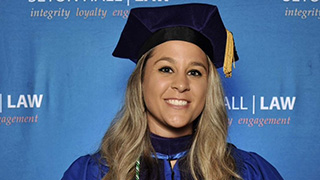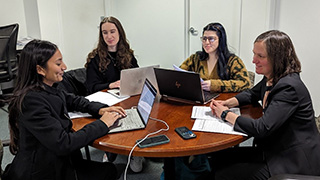Grants, Research and Community Service
Wednesday, December 6, 2023

Center Faculty, Professors John Jacobi and Tara Ragone, have been the recipients of significant grant funding.
Center Faculty, Professors John Jacobi and Tara Ragone, have been the recipients of significant grant funding, allowing them to conduct research and improve the quality of life for communities across the State of New Jersey.
Professors Jacobi and Ragone continue to work closely with the New Jersey Department of Health (NJ-DOH) to create and sustain a workforce of community health workers who help address care and service gaps for vulnerable populations. Over the past four years, Seton Hall Law has been a key partner of the NJ DOH as it launched the Colette Lamothe-Galette Community Health Worker Institute. Professors Jacobi and Ragone co-chair the Sustainability and Employment Committee, serve on the Advisory Committee, and will help lead the Legislative Workgroup. Their leadership will help the Institute establish a certification program for CHWs and support CHWs as they pursue a professional organization in the state. In addition, Professors Jacobi and Ragone will support NJ Medicaid and NJ’s Medicaid Managed Care Organizations (MCOs) as they implement the 5-year CHW pilot that the Center for Medicare & Medicaid Services (CMS) recently approved as part of New Jersey’s 1115 waiver demonstration renewal. This pilot provides an additional $5 million to MCOs who propose Medicaid-approved CHW interventions that target vulnerable populations.
In addition, Professors Jacobi and Ragone continue to build sustainability for HealthySteps programs that promote holistic pediatric health. They received additional funding to support their continued partnership with Zero to Three (ZT T) to build sustainability for HealthySteps, an evidence-based, interdisciplinary pediatric primary care program that promotes the health, well-being, and school readiness of babies and toddlers, with an emphasis on families living in low-income communities. They are working with key partners to put in place statutory and regulatory mechanisms for reimbursement of the work of HealthySteps Specialists, who deliver integrated, preventive care to young children and their caregivers. Work will focus on implementing a line-item in New Jersey’s Fiscal Year 2024 budget that requires MCOs to develop an enhanced payment for well-child and sick visits at HealthySteps sites, as well as continued investigation of potential legislative and regulatory solutions.
Professors Jacobi and Ragone, as well as a number of Seton Hall Law Students, advanced a number of health equity and access projects thanks to the support and vision of the State of New Jersey. The State’s F Y23 budget allocated funding to advance legal, regulatory, and policy research concerning a number of health-related issues, including telehealth and health equity; improving transitions for young adults with intellectual and developmental disabilities; supportive housing and Medicaid; and expanding access to care for our uninsured. The funding allocation also suppor ted public education oppor tunities, including the Center’s Annual Health Law Symposium on Medical Misinformation (see page 3). The Center continues to engage in these vital policy projects in FY24.
Professor John Jacobi continues to provide support and guidance on the issue of integrated behavioral health. Together with other leading health advocates in New Jersey, Professor Jacobi advocates the State to streamline inefficient licensing rules for health services, particularly those that concern access to integrated outpatient mental health and substance use disorder treatment. Despite numerous studies over decades showing that integrating primar y physical and behavioral health care improves access to high quality treatment, patient engagement, clinical outcomes, and patient satisfaction, care remains siloed and fractured, due in large measure to arcane, conflicting, licensing regulations and interpretations that hinder holistic care. Professors Jacobi and Ragone and Kate Greenwood, with funding from The Nicholson Foundation, conducted an exhaustive review of challenges to providing integrated primary and behavioral health care in New Jersey outpatient facilities. In Integration of Behavioral and Physical Health Care: Licensing and Reimbursement Barriers and Opportunities in New Jersey (2016), they identified, and made a number of recommendations to, address these barriers and improve access to this accepted gold standard of care, including recommending a single license that would permit facilities to provide holistic, integrated care. In 2017 and 2018, the New Jersey Legislature passed legislation requiring regulations to create an integrated licensing system that would permit facilities to provide primary care, mental health care, and substance use disorder treatment under a single license. Although the New Jersey Department of Health has taken policy steps that begin to facilitate some level of integration, it has not yet proposed comprehensive regulations to permit a single license. In fall 2023, Professor Jacobi helped author a multi-stakeholder letter urging the NJ DOH Commissioner to move forward expeditiously with proposing regulations creating an integrated facility license. Professors Jacobi and Ragone will continue to offer support to the State to realize this critical, long-overdue, and statutorily required policy reform.





